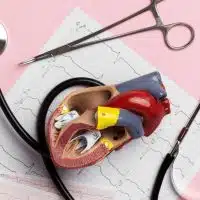
The Warning Signs: How Drastic Weight Loss Could be a Symptom of Hyperthyroidism – Hyperthyroidism is a medical condition that affects the thyroid gland, a small butterfly-shaped organ located in the neck. The thyroid gland plays a crucial role in regulating the body’s metabolism, controlling how quickly the body uses energy. When the thyroid gland becomes overactive, it produces excessive amounts of thyroid hormones, leading to a condition known as hyperthyroidism.
What is hyperthyroidism?
Hyperthyroidism is a condition characterized by an overactive thyroid gland. This means that the thyroid gland produces an excessive amount of thyroid hormones, such as thyroxine (T4) and triiodothyronine (T3). These hormones play a vital role in regulating various bodily functions, including metabolism, heart rate, and body temperature.
Understanding the symptoms of hyperthyroidism
Hyperthyroidism can manifest in a variety of symptoms, with drastic weight loss being one of the most common signs. The increased metabolic rate caused by excess thyroid hormones can lead to rapid weight loss, despite maintaining a normal or increased appetite. Other symptoms may include:
- Increased heart rate and palpitations: An overactive thyroid can cause the heart to beat faster than usual, leading to a rapid or irregular heartbeat.
- Excessive sweating and heat intolerance: People with hyperthyroidism often experience profuse sweating and have difficulty tolerating heat.
- Nervousness and irritability: Hyperthyroidism can cause anxiety, restlessness, and irritability, making it difficult to concentrate and relax.
The link between hyperthyroidism and drastic weight loss
Drastic weight loss often serves as a red flag for many health conditions, including hyperthyroidism. The increased metabolic rate caused by an overactive thyroid causes the body to burn calories at a faster rate, leading to unexplained weight loss. This weight loss can occur even if the individual has a healthy appetite and is consuming an adequate amount of calories.
It’s important to note that weight loss due to hyperthyroidism is often accompanied by muscle weakness and fatigue. This is because the excessive thyroid hormones interfere with the body’s ability to build and maintain muscle mass. Therefore, if you or someone you know is experiencing drastic weight loss alongside other symptoms mentioned earlier, it’s crucial to seek medical attention promptly.
Other common symptoms of hyperthyroidism
In addition to drastic weight loss, hyperthyroidism can present with several other symptoms that should not be ignored. These symptoms may include:
- Bulging eyes: Known as exophthalmos, bulging eyes are a characteristic feature of Graves’ disease, an autoimmune condition often associated with hyperthyroidism.
- Tremors and muscle weakness: Hyperthyroidism can cause trembling hands and muscle weakness, making it difficult to perform simple tasks.
- Increased appetite: Despite experiencing weight loss, individuals with hyperthyroidism often have an increased appetite and may feel hungry more frequently.
When to seek medical attention
If you are experiencing any of the symptoms mentioned above, especially if you have noticed drastic weight loss, it is essential to seek medical attention promptly. Hyperthyroidism can have serious consequences if left untreated, including heart problems, brittle bones, and even thyroid storm, a life-threatening condition.
It is advisable to consult a healthcare professional who can perform a thorough evaluation, including a physical examination and blood tests to check your thyroid hormone levels. Early diagnosis and treatment are key to managing hyperthyroidism effectively and preventing further complications.
Diagnosing hyperthyroidism
Diagnosing hyperthyroidism typically involves a combination of medical history, physical examination, and laboratory tests. The healthcare professional will inquire about your symptoms, family history, and perform a physical examination to check for any visible signs, such as an enlarged thyroid gland or bulging eyes.
Blood tests are essential in diagnosing hyperthyroidism. These tests measure the levels of thyroid hormones, such as T3 and T4, as well as thyroid-stimulating hormone (TSH), which is produced by the pituitary gland and regulates the thyroid gland’s activity.
Treatment options for hyperthyroidism
There are several treatment options available for hyperthyroidism, depending on the severity of the condition and individual circumstances. These treatment options may include:
- Medication: Antithyroid medications, such as methimazole or propylthiouracil, can help block the production of excess thyroid hormones and reduce symptoms. These medications are often prescribed for a specific period, and regular monitoring of thyroid hormone levels is necessary.
- Radioactive iodine therapy: This treatment involves ingesting radioactive iodine, which is taken up by the thyroid gland and destroys the overactive thyroid cells. This procedure effectively reduces thyroid hormone production but may lead to hypothyroidism, requiring lifelong hormone replacement therapy.
- Surgery: In some cases, surgical removal of a part or all of the thyroid gland may be necessary. This is often considered when other treatment options are not suitable or if there is a concern of thyroid cancer.
Managing weight loss and hyperthyroidism
When it comes to managing weight loss caused by hyperthyroidism, it is crucial to address the underlying condition while also focusing on maintaining a balanced and nutritious diet. Here are a few tips to help manage weight loss in the context of hyperthyroidism:
- Consult with a registered dietitian: A dietitian can help develop a personalized meal plan that ensures you are getting adequate nutrition while managing your weight.
- Prioritize nutrient-dense foods: Focus on consuming foods that are rich in vitamins, minerals, and healthy fats. This includes fruits, vegetables, lean proteins, whole grains, and healthy fats like avocado and nuts.
- Regular exercise: Engaging in physical activity can help build muscle mass and improve overall strength. However, it is important to consult with your healthcare provider before starting any exercise regimen to ensure it is safe and appropriate for your condition.
Conclusion: Taking control of your health
Drastic weight loss can be a concerning symptom, especially when accompanied by other signs of hyperthyroidism. Recognizing the warning signs and seeking medical attention promptly is crucial for an accurate diagnosis and effective management of hyperthyroidism.
If you are experiencing drastic weight loss alongside symptoms like increased heart rate, excessive sweating, or nervousness, it is essential to consult with a healthcare professional. Early diagnosis and appropriate treatment can help alleviate symptoms, prevent complications, and improve overall quality of life.
Remember, your health is in your hands. Take control by reaching out to medical professionals who can guide you on your journey towards optimal well-being. For more information, please call BIMC Hospital Nusa Dua.











